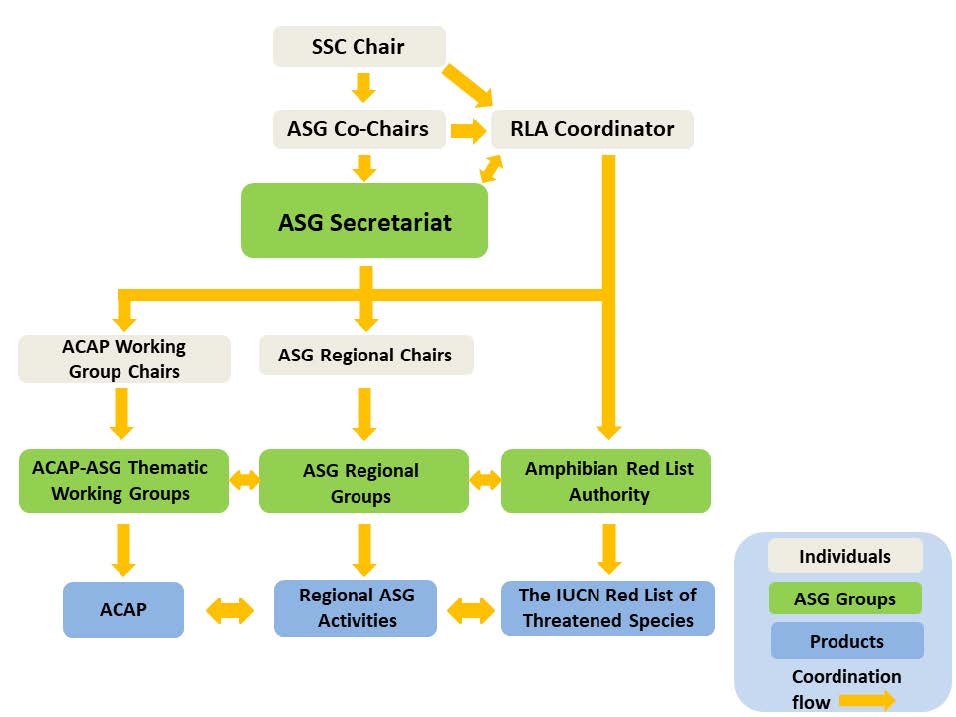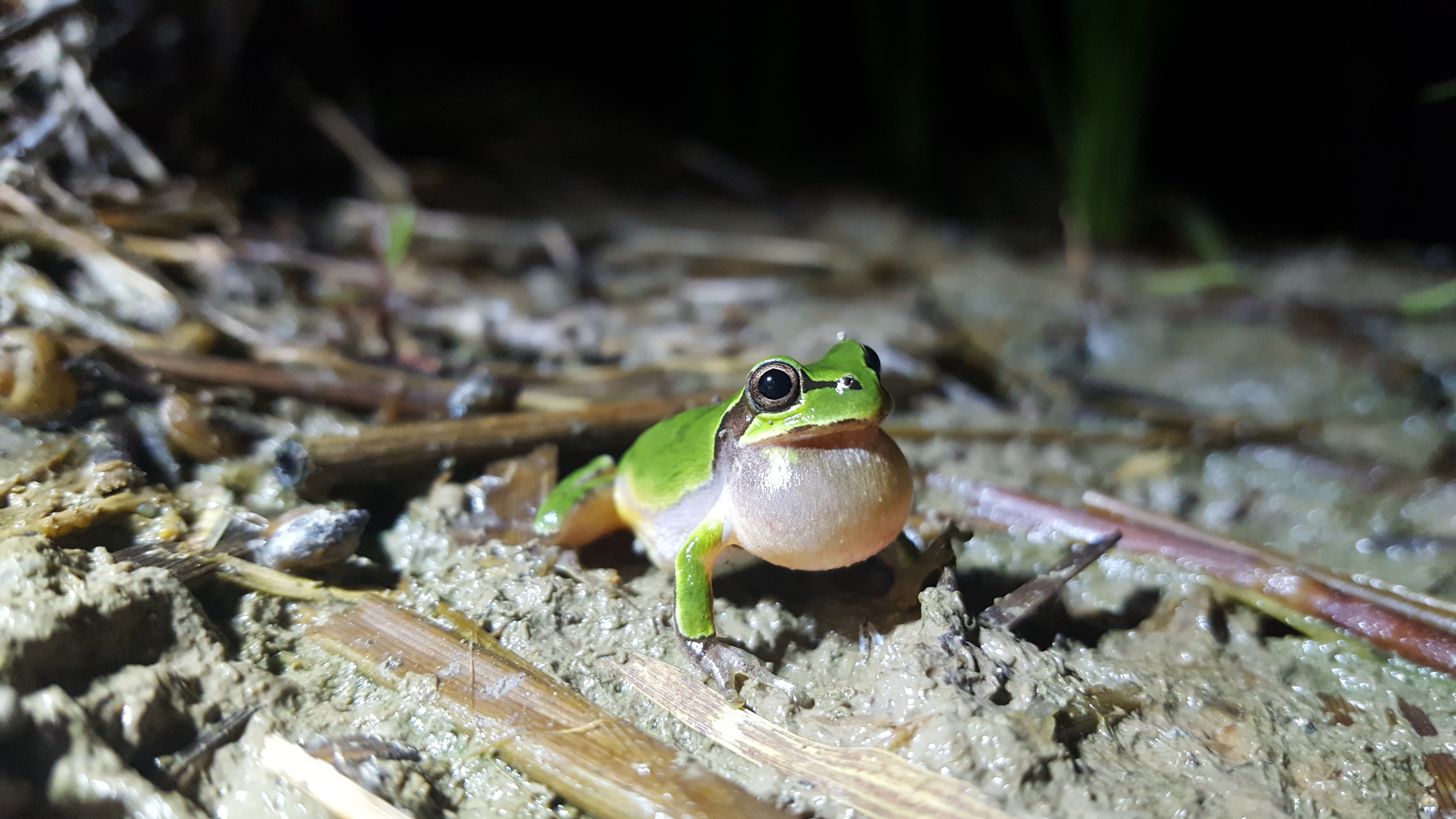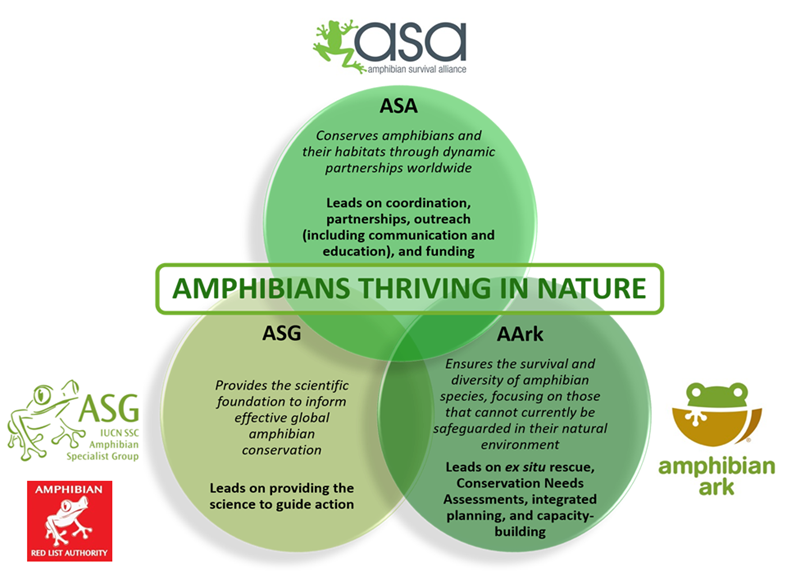IUCN SSC Amphibian Specialist Group
Our mission
The Amphibian Specialist Group provides the scientific foundation to inform effective amphibian conservation action around the world. More specifically, the ASG stimulates, develops and conducts scientific research to inform the conservation of amphibians and their habitats around the world, supports the assessment of the conservation status of amphibian biodiversity and informs the general public of amphibian conservation-related issues and priorities. This is attained by supporting and mobilizing a global network of members to develop capacity, improve coordination and integration so as to achieve shared, strategic amphibian conservation goals.
How does the ASG work?
The ASG has several strategic components that allow it to take a multi-pronged approach to global amphibian research and conservation. Below you’ll find links to some of ASG’s key components. The details of how ASG is organized and how it works are covered in its 2019-2020 Strategic Plan. For further detailed information, please refer to this document.
Three pillars
ACAP and Thematic Working Groups
The Amphibian Conservation Action Plan (ACAP) was first published in 2007, following a seminal Amphibian Conservation Summit in Washington, DC, in 2005. In 2015, ASG updated ACAP and changed its format to become a living document, with the intent of converting it into a practical framework for global amphibian conservation, which would be updated regularly and would best reflect more recent developments and needs.
ACAP is updated by ASG Thematic Working Groups that align with the original ACAP chapters and is used by the Amphibian Survival Alliance to give direction to its strategic conservation actions.
LEARN MORE ABOUT THE THEMATIC WORKING GROUPS
Regional Groups
Although the ASG is global in scope, it also works at the regional/national levels, and the activities in regions/countries are led by Regional Chairs. Regional Chairs are responsible for coordinating and organizing ASG activities within their respective regions, and represent the ASG within their communities and among regional stakeholders.
LEARN MORE ABOUT REGIONAL GROUPS
Amphibian Red List Authority
The Amphibian Red List Authority (Amphibian RLA) oversees the process of updating, maintaining and curating amphibian assessments in the IUCN Red List of Threatened Species. The Amphibian RLA is thus the branch of the ASG that devotes itself to maintaining amphibian extinction risk assessments. Since late 2015 the Amphibian RLA has a small Central Coordination Team that will be devoting its efforts to complete the second Global Amphibian Assessement by the end of 2018.
LEARN MORE ABOUT THE AMPHIBIAN RLA

Strategic plan
IUCN SSC Amphibian Specialist Group Strategic Plan 2015-2016
The IUCN SSC Amphibian Specialist Group (ASG) is a global network of amphibian scientists and other experts with an interest in amphibian conservation that strives to provide the best possible science to inform amphibian conservation. There are various components to the ASG:
Geography and membership
Although the ASG is global in scope, it also works at the regional/national levels, and the activities in regions/countries are led by Regional Chairs. Regional Chairs are responsible for coordinating and organizing ASG activities within their respective regions, and represent the ASG within their communities and among regional stakeholders.
Working Groups
ACAP-ASG Thematic Working Groups are groups of interested experts with expertise on specific topics relevant to the global Amphibian Conservation Action Plan (ACAP). Led by one or more facilitators, these working groups develop priorities for their individual remits, which are then used to advance a particular field as it pertains to amphibian conservation.
Task Forces
The Task Forces are smaller groups of ASG members with a specific taxonomic or thematic focus who wish to consolidate efforts and build knowledge on their respective study subjects. Similarly to Working Groups, Task Forces are coordinated by one or more coordinators, who are responsible for establishing and coordinating the Task Force’s activities.
Programs
The ASG currently has one shared program (ASG/ASA Youth) and one stand-alone program (ASG Mentorship). These programs are intended to promote capacity building in amphibian research and conservation (ASG Mentorship), and increase awareness and interest among future generations of amphibian conservationists (ASG/ASA Youth).
Please browse through the ASG Strategic Plan (link on the right and below) for an overview of the mission, goals and components of ASG for the 2015-2016 period, as well as additional information on other aspects of ASG.

Partners
The amphibians.org Partnership
The IUCN SSC Amphibian Specialist Group’s (ASG) online home had previously been www.amphibians.org. In 2013 it expanded to include the Amphibian Survival Alliance (ASA). In 2018 ASG and ASA decided to have their own separate websites so that they could better serve their specific audiences, with ASG donating the amphibians.org domain to ASA. As of 2018 ASG’s online home is iucn-amphibians.org. Because ASG and ASA work very closely (ASG is ASA’s scientific advisor) we still cross-link to each other’s pages as needed.
The ASG is IUCN’s network of the world’s leading amphibian experts providing scientific guidance to identify and inform conservation action. The ASA is a global partnership of over 100 organizations, institutions and groups who in turn coordinate and support the implementation of amphibian conservation action. As the scientific advisory body of the ASA, the ASG was requested to coordinate the updating of the 2007 Amphibian Conservation Action Plan (ACAP) to better reflect the current challenges, and ASG has already produced its first version of a living ACAP document. The ASG is uniquely positioned to work with the ASA to identify the current challenges to amphibian conservation, and to recommend potential solutions, having a broad membership represented across more than 40 regions from around the world. In mid-2013 the ASG initiated establishment of the Thematic Working Groups designed to identify priority actions that would be executed primarily through the ASA, with the ASA Secretariat acting as a coordinating implementation body. As knowledge increases and progress is made, the priority actions will evolve, helping to redefine the new ACAP as a living document.
iucn-amphibians.org is a portal to the global response to amphibian declines. Use it to share information, build partnerships and save amphibians. Contact us to discuss more about amphibians.org and the ASG.

